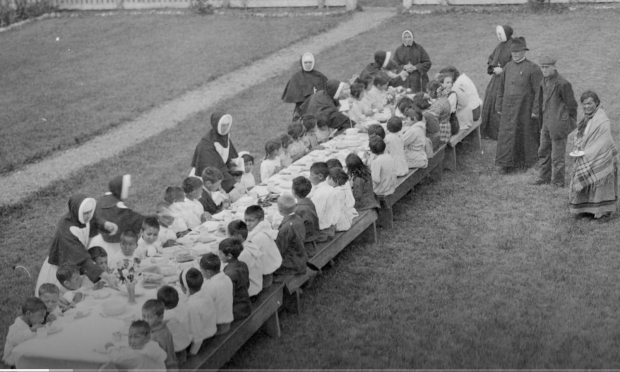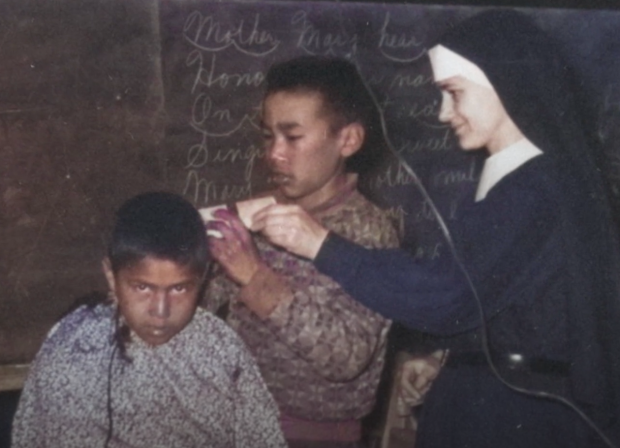Lenten Campaign 2025
This content is free of charge, as are all our articles.
Support us with a donation that is tax-deductible and enable us to continue to reach millions of readers.
“The Spirit of the Lord God is upon me, Because the Lord has anointed me to bring good news to the afflicted; He has sent me to bind up the brokenhearted, to proclaim liberty to captives and freedom to prisoners.” (Isaiah 61:1)
When the affliction, the pain, and the brokenness has come at the hands of the Church, all the more essential that its leaders take responsibility and work towards healing and reconciliation.
That is what Pope Francis was doing in Canada this week. But a papal trip, especially one he called a "penitential pilgrimage," doesn't happen all the time. So what exactly is the backstory of this trip?
Salt + Light, a Canadian Catholic media company, has created a short documentary called Walking Together that tells the story. And it begins with a very dark history.
The mission of the residential schools

From the mid 1800s until the 1990s the Canadian government operated a system of schools whose sole purpose was to isolate Indigenous children from their families in order to assimilate them into the rest of society. These school were known as Indian Residential Schools.
The 59-minute documentary explains that 141 schools were in operation across Canada and were administered by various Christian churches: Catholic, Anglican, Methodist, United, Presbyterian, Baptist, and Mennonite. Sixty-eight of the schools were administered by Catholic dioceses or religious congregations. In 1920, amendments were made to Canada's Indian Act that forced children between ages 7 and 15 to attend a residential school. If parents protested, they could be arrested.
The children were often sent to schools thousands of miles away from their families, and not allowed to speak their native languages or practice their traditions. Conditions at many of the schools were harsh and difficult.
About 150,000 students went through the residential school system, and many experienced the very worst abuses, sometimes at the hands of priests and religious. About 6,000 children never returned home at all.

While there were certainly people in the schools who cared for the children and wanted the best for them, the fundamental purpose of the schools was to enact a government policy that sought to eradicate the children's culture, identity, and languages. When the last of the schools closed in 1998, it was not the end of the story. The effects of the residential schools has had many consequences: intergenerational trauma, higher levels of incarceration, poor economic and educational outcomes, domestic abuse, substance abuse, depression, suicide, and more.
Historic meetings in Rome
Salt + Light's documentary follows the trip of Indigenous leaders to Rome in March and April 2022 to tell the pope their stories, and how these historic meetings led to the bishops of Canada inviting the pontiff to come and meet with the Indigenous people on their own land.
"I want us to welcome him. Our land is ingrained in our DNA as a people," Chief Willie Littlechild says in the documentary about the idea of the Holy Father making the trip to Canada.
For Cassidy Caron, president of the Metis National Council, the meetings in Rome did not disappoint,

The film covers the meetings in Rome, as well as the painful experiences and acquired wisdom of Indigenous leaders -- representatives of the Assembly of First Nations, Métis National Council, and Inuit Tapiriit Kanatami. Their personal accounts are moving. The beauty of their witness, the way some have managed to retain their Christian faith, and their hope for healing is inspiring.
The film intersperses their personal testimonies with historic photos and footage of the Holy Father's address to the delegates in Rome, which included a personal apology.
The film is the first of a series of three documentaries that Salt + Light Media will be producing about residential schools, Indigenous Peoples and faith, and the truth and reconciliation process. The second is in production and is expected to be completed by late fall of 2022. It is available at no charge online or by downloading an app from the Roku and Amazon Fire TV stores. A French-subtitled version is being completed and will be released shortly.



